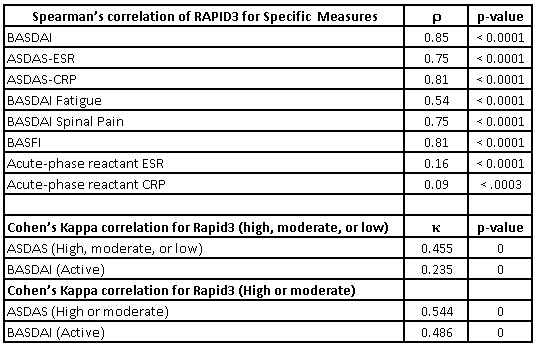Session Information
Session Type: ACR Poster Session B
Session Time: 9:00AM-11:00AM
Background/Purpose: Outcome measures in AS are well established in clinical trial settings but infrequently used in real-world (RW) practice. These measures include the BASDAI, BASFI, and ASDAS. The RAPID3 is an established RA measure, but infrequently used in real world (RW) settings. It has been tested most recently in 75 patients with AS correlating RAPID3 scores with BASDAI and ASDAS-ESR1. The purpose is to compare RAPID3 to BASDAI, BASFI, ASDAS-(CRP, ESR), in a cross-sectional analysis of 456 AS patients enrolled in the JointMan® registry (JM), a real-world (RW) database capturing five AS outcome measures.
Methods: A retrospective review of data collected in the JM registry. These study measures were recorded in 456 patients at 1706 visits. Indices and individual measures were compared using Spearman’s (ρ) and Cohen’s Kappa (κ) correlations.
Results: BASDAI > 4, active AS, correlated with moderate/high RAPID3; Kappa of 0.486 (p = 0.001). ASDAS >1.3, high disease activity correlated with moderate/high RAPID3; Kappa correlation of 0.544 (p = 0.001).
| Patient Characteristics | Value |
| Mean Age (SD) |
52 (14.16) |
| Female |
45.83% |
| White |
90.57% |
| HLA-B27 (+) |
61.90% |
Conclusion: RAPID3 is the most common outcome measure utilized in RW settings for managing patients with RA. In clinical practice this outcome is frequently obtained in all patients seen in a rheumatology office at the time of registration prior to the rheumatologist’s evaluation although it has only been validated in RA. In this cross sectional study of a large cohort of patients with AS, RAPID3 results had high correlations with BASDAI, BASFI, and ASDAS. This study supports the use of the RAPID3 in RW rheumatology practices for patients with AS.
1. Park et al. J. of Clin. Rheum. 2015;21(6):300-304.
To cite this abstract in AMA style:
Schwartzman S, Knapp K, Craig G. The Importance of Outcome Measures in Ankylosing Spondylitis – Validity of the Routine Assessment of Patient Index Data 3 in a Real World Cohort [abstract]. Arthritis Rheumatol. 2016; 68 (suppl 10). https://acrabstracts.org/abstract/the-importance-of-outcome-measures-in-ankylosing-spondylitis-validity-of-the-routine-assessment-of-patient-index-data-3-in-a-real-world-cohort/. Accessed .« Back to 2016 ACR/ARHP Annual Meeting
ACR Meeting Abstracts - https://acrabstracts.org/abstract/the-importance-of-outcome-measures-in-ankylosing-spondylitis-validity-of-the-routine-assessment-of-patient-index-data-3-in-a-real-world-cohort/

